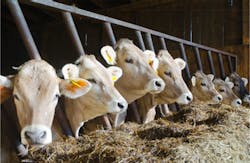The European Food Standards Agency (EFSA) has approved the use of the controversial enzyme thrombin in food processing.
Thrombin is derived from the blood of pigs or cattle and is used with fibrinogen, a protein also obtained from the blood of these animals, as a binding agent for pieces of meat or fish.
The agency provided its scientific opinion following a request from the European Commission. Its panel on Food Contact Materials, Enzymes, Flavourings and Processing Aids (the CEF Panel) concluded that since it is “obtained from cattle and pig’s blood that is fit for human consumption, and is processed hygienically”, the enzyme poses no safety concerns.
Additionally, “considering the origin of the food enzyme, the CEF Panel considers that the likelihood of a food allergic reaction to this thrombin is low and, therefore, it does not give rise to safety concerns,” it added.
In a statement, the panel said: “[We] conclude that thrombin poses no safety concerns based on the fact that it derives from parts of the animals that are intended for human consumption and provided that it is produced under hygienic conditions in accordance with EU rules.”
The experts used the EFSA Comprehensive European Food Consumption Database to estimate dietary exposure to thrombin. The estimated mean and 95th percentile exposure across five population groups ranged from 3 to 12 micrograms (µg) TOS (total organic solids)/kg body weight/day and from 6 to 24µg TOS /kg bw/day, respectively.
